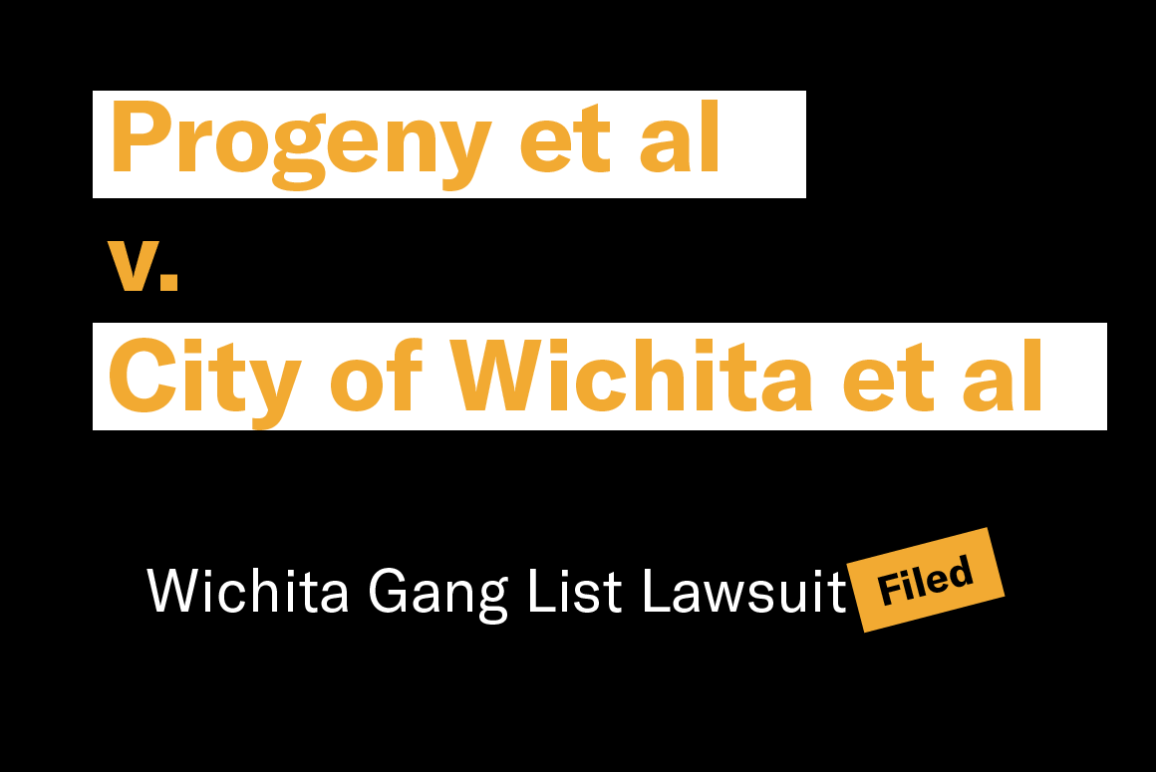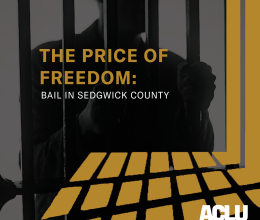To learn about your rights following the settlement in this case, click here.
On April 15, 2021 the ACLU of Kansas and Kansas Appleseed filed a class-action lawsuit against the City of Wichita, challenging the Wichita Police Department's use of a "gang" list.
Members of the Wichita community do not have to commit or even be charged with a criminal offense to be placed on the Gang List. According to the complaint, the criteria to be included in the List–which come from state law–are “vague and broad and encompass a wide range of innocuous, innocent, and constitutionally protected behavior.” By statute and WPD policy, the color of clothing you wear, where you hang out or who you are photographed with could all result in WPD placing you on the Gang List.
Police officers within the WPD’s Gang Unit routinely exercise unilateral and virtually unchecked power to designate individual Wichita residents as “gang members” or “gang associates” based on scant and unreliable evidence, or, indeed, no evidence at all. Their policies do not require that a person be convicted of a crime, charged with a crime, or even suspected of being involved in criminal activity in order to be designated as a gang member.
In the lawsuit we assert that these practices and policies disproportionately target individuals of color and violate the First, Fourth, and Fourteenth Amendments to the United States Constitution.
Though only 7.5 percent of Wichita’s population is Black, Black residents comprise over 50 percent of the Gang List. Latinx individuals make up nearly 30 percent of the List, yet only account for 14.1 percent of Wichita’s population. Despite making up nearly 68 percent of Wichita’s population, less than 14 percent of those on the Gang List are white. As of May 2022, the Gang List included at least 5,507 individuals.
Inclusion on the Gang List subjects an individual to a wide range of severe civil and criminal consequences, including enhanced bail and probation and parole terms, limited plea opportunities, extreme prejudice at criminal trials, widespread reputational harm, denial of associative and assembly rights, and discrimination in housing, licensing, and employment.
WPD identifies people as “gang members” and places them on the Gang List without notice or due process. Merely associating with other people on the Gang List can result in being added to the List. The Gang List and the list of places designated as gang territory are not publicly available. There is no way to challenge one’s listing or request an individual’s removal from the List.
People on WPD’s Gang List find it difficult to participate in regular aspects of life, including seeing friends or loved ones. People on the List cannot be seen with other people on the List, or visit certain businesses or neighborhoods that WPD has classified as gang territory.
According to the lawsuit, WPD’s use of the Gang List is unconstitutional and violates community members’ First, Fourth and Fourteenth Amendment rights. Attorneys bringing the suit are asking for injunctive and declaratory relief, challenging both Kansas law and WPD policy. Plaintiffs ask that the City of Wichita immediately cease its use of the Gang List and prohibit the operation of a Gang List in the future.
In July 2021, the Court granted defendants' motion to stay discovery pending a ruling on a motion to dismiss.
In January 2022, the Court ruled on the motion to dismiss. The ruling dismissed three claims, including a substantive due process claim and an equal protection claim, but left in place the remaining four claims and found that each of the plaintiffs have standing. One claim brought individually on behalf of Progeny was found to be without standing, but the remaining claims brought on behalf of Progeny will go forward. The order also lifted the discovery stay in the case.
In June 2023, Plaintiffs moved for class certification. In October 2023, the Court granted Plaintiffs’ motion, certifying a class of “all living persons included in the Wichita Police Department’s Gang List or Gang Database as an Active or Inactive Gang Member or Gang Associate.”
Following extensive discovery, the parties filed cross-motions for summary judgment in October 2023. In January 2024, the Court denied both sides’ motions, dismissing without prejudice two of Progeny’s claims for lack of standing but retaining all other claims. The case was scheduled for a bench trial in May 2024.
In April 2024, the parties reached an agreement to settle the case. The settlement agreement includes substantial reforms to the WPD’s Gang List policy and practices. The Court granted preliminary approval of the settlement on May 17, 2024. Following a final fairness hearing on August 23, 2024, the Court granted final approval of the settlement.
If you are or believe you may be in the gang database, please click here to learn about your rights under the settlement.






